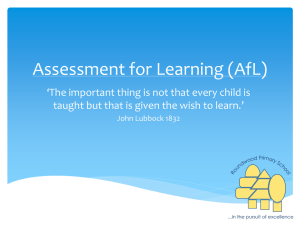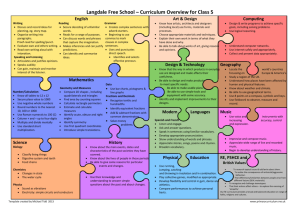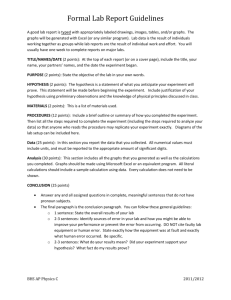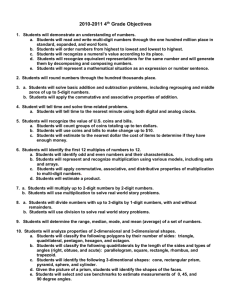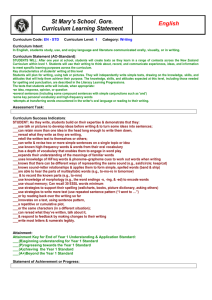What does a level mean in Writing?
advertisement
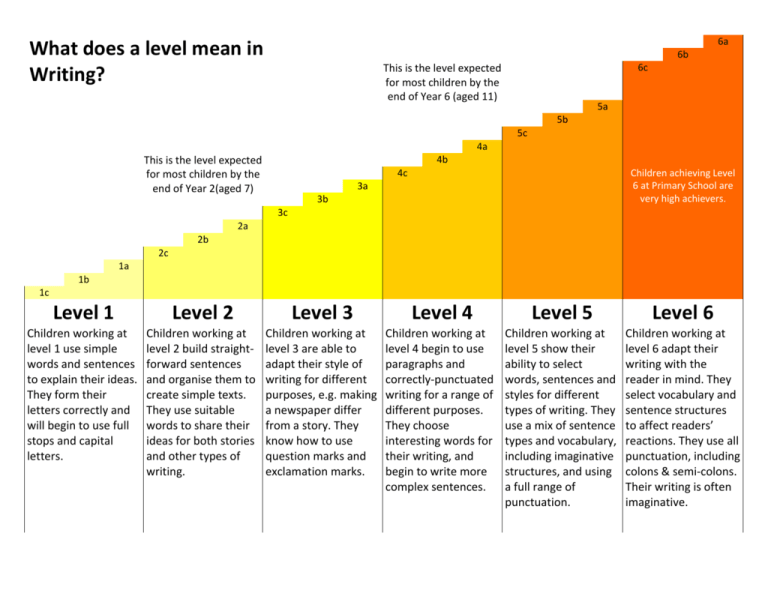
6a What does a level mean in Writing? 6b 6c This is the level expected for most children by the end of Year 6 (aged 11) 5a 5b 5c 4a 4b This is the level expected for most children by the end of Year 2(aged 7) 4c Children achieving Level 6 at Primary School are very high achievers. 3a 3b 3c 2a 2b 2c 1a 1b 1c Level 1 Level 2 Level 3 Level 4 Level 5 Level 6 Children working at level 1 use simple words and sentences to explain their ideas. They form their letters correctly and will begin to use full stops and capital letters. Children working at level 2 build straightforward sentences and organise them to create simple texts. They use suitable words to share their ideas for both stories and other types of writing. Children working at level 3 are able to adapt their style of writing for different purposes, e.g. making a newspaper differ from a story. They know how to use question marks and exclamation marks. Children working at level 4 begin to use paragraphs and correctly-punctuated writing for a range of different purposes. They choose interesting words for their writing, and begin to write more complex sentences. Children working at level 5 show their ability to select words, sentences and styles for different types of writing. They use a mix of sentence types and vocabulary, including imaginative structures, and using a full range of punctuation. Children working at level 6 adapt their writing with the reader in mind. They select vocabulary and sentence structures to affect readers’ reactions. They use all punctuation, including colons & semi-colons. Their writing is often imaginative. 6a What does a level mean in Reading? 6b 6c This is the level expected for most children by the end of Year 6 (aged 11) 5a 5b 5c 4a 4b This is the level expected for most children by the end of Year 2(aged 7) 4c Children achieving Level 6 at Primary School are very high achievers. 3a 3b 3c 2a 2b 2c 1a 1b 1c Level 1 Level 2 Level 3 Level 4 Level 5 Level 6 Children working at level 1 are able to recognise some common words, and use simple sounding out to read others. They can understand simple stories that they have read. Children working at level 2 use a mix of skills to read words and can therefore read simple stories or other types of writing. They can talk about what they have read. Children working at level 3 show understanding of what they have read, including making simple inferences about things such as the feelings of characters in a story. They read fluently when reading aloud. Children working at level 4 are able to draw inferences about characters and actions in stories. They can read a variety of types of writing. They can explain some simple decisions made by authors, such as use of layout features in non-fiction writing. Children working at level 5 are able to read complex texts and find a range of information from them. They are able to explain some choices made by authors, such as particular vocabulary choices and can confidently ‘read between the lines’. Children working at level 6 show insight into the ways authors create texts, and can use quotations to explain their understanding. They can explore the relationship between authors, characters and the reader based on what they read and wider context. 6a What does a level mean in Maths? 6b 6c This is the level expected for most children by the end of Year 6 (aged 11) 5a 5b 5c 4a 4b This is the level expected for most children by the end of Year 2(aged 7) 4c Children achieving Level 6 at Primary School are very high achievers. 3a 3b 3c 2a 2b 2c 1a 1b 1c Level 1 Level 2 Level 3 Level 4 Level 5 Level 6 Children working at level 1 are able to count and read and write the numbers up to 10. They can carry out simple calculations using numbers up to 10. They can sort things, such as shapes, into different categories based on their properties. Children working at level 2 understand place value in numbers. They recognise patterns such as odd and even numbers. They can use skills like doubling and halving, and know numberpairs off by heart (e.g. knowing that 6+3 = 9) Children working at level 3 can work with numbers up to 1000. They can use simple fractions, begin to learn their times tables and solve problems in £ and p. They can use 2d and 3d shapes, and reflect simple 2d shapes. They can create simple graphs. Children working at level 4 know their tables up to 10x10. They use efficient methods to carry out + - x & ÷ calculations. They can use fraction percentage and decimal values. They can use graph axes and scale measures, and can calculate simple averages. Children working at level 5 understand the relationships between numbers less than 0. They can multiply 2-digit by 3digit numbers. They can find the area and perimeter of shapes. They create and interpret graphs. They begin to use simple algebra. Children working at level 6 work with confidence using a range of numbers, including calculations with fractions. They can solve simple algebraic equations. They can build a range of graphs, and can use fractions to calculate probability of various events.
